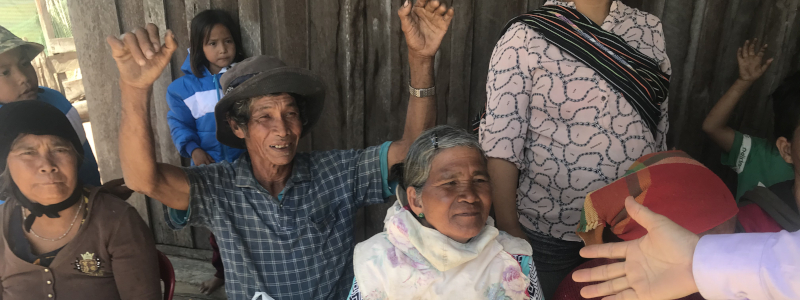In a country where one tribe walks on burning coals to demonstrate the power of supernatural evil, two women at a church asked a visiting leader of a ministry based in Vietnam to pray for their deliverance from demonic attacks.
When they lay in bed at night, they said, they suffered deep dread as they felt the devil’s power – a sensation of cold going from their feet to their heads, cold sweats and uncontrollable shaking.
“Please pray for us,” one of the women said. “We don’t know what this is.”
The ministry leader asked if their husbands, also members of the local church, suffered the same kind of attacks. The women said they did not.
“The ceremony, practiced on tribal festival days, puts the fire-walkers in a trance as they walk on burning coals.”
“You cannot escape these attacks by yourself,” the leader told them. “You have to pray, ‘In the name of Jesus Christ, get out!’ and believe 100 percent that He will deliver you.”
The leader prayed for the two women. When the area leader visited the ministry leader three months later, he thanked the leader and the Lord that the women were no longer experiencing the demonic attacks.
Demonic Ritual
The ministry leader said belief in evil spirits exerts a death grip on animistic ethnic groups, including one that practices “fire-walking.”
“It’s a devil-worship ceremony,” he said. “They bleed a chicken on the altar to release the demon power so men can walk on fire for 10 minutes without getting burned.”
The ceremony, practiced on tribal festival days, puts the fire-walkers in a trance as they walk on burning coals; it exalts supernatural evil and tightens the demonic hold on fearful villagers, said an executive at Christian Aid Mission.
“It demonstrates a supernatural power of cruel bondage, and the ministry leader and other local missionaries tell villagers how the power of the Cross overcomes the power of that cruel bondage,” the executive said. “One reason workers have such joy and zeal when they share the gospel is that they’ve been set free from that bondage.”
He said the ministry leader has identified ethnic members or near-culture people in five unreached peoples who can serve as a nucleus for gospel outreach this year.
“He looks for people who know the language and have the cultural connection,” he said. “He finds the kind of people who can go in there and have rapport and reach people with the gospel; no foreign missionary could do this.”
Opposition
At the same time, local officials in Vietnam prohibit anyone from going to unreached people groups to proclaim the gospel, the native ministry leader said.
There is no law against bringing new ideas to these ethnic groups, but the most common pretext for arresting native missionaries is crossing ethnic “borders” and proclaiming Christ, he said.
“Noting they are different, local officials will come up to them right away,” the leader said. “They are in violation of the [supposed] law, but not in violation of God’s law.”
As the gospel penetrates more areas through such risks and sacrifices, villagers come to the Lord not so much from hearing the Word as from seeing the transformation in their neighbors, the leader said. Drunkenness and beating of wives and children are so common that when a villager stops doing so after receiving Christ, neighbors not only take notice but are astonished at the change, he said.
The change in one man who stopped drinking and beating his family after putting his faith in Christ led to the planting of two churches of more than 100 members each, he said.
“People see a totally different man who is different from all other men, and they put their faith in Christ,” the leader said. “The Bible comes later.”
Local missionaries have begun evangelistic work among seven unreached people groups and within five years plan to reach the five other groups where contacts have been established, he said. Starting in 2027, they plan to reach another 10 groups within 10 years, toward the goal of planting churches among 15 more unreached people groups by 2036.
The ministry’s government-recognized program of theological training of disciples and leaders is critical as churches cannot operate legally unless they are led by a certified pastor. The government also requires churches to have a building and at least 100 members.
Meeting all the criteria is difficult for most nascent fellowships meeting in homes, and persecution by villagers and local officials can happen to both underground and officially recognized churches. In one area, five of seven newly Christian families recanted under local pressure, and the two families who refused to recant were arrested and beaten so severely they had to be hospitalized, the leader said.
The ministry provided the two new Christian families with $400 worth of medical treatment, including antibiotics, anti-inflammatories and pain-killers.
Local missionaries throughout the country are helping the persecuted and risking arrest and harm themselves as they bring the message of salvation in Christ. Please consider a donation today to equip and encourage them.

